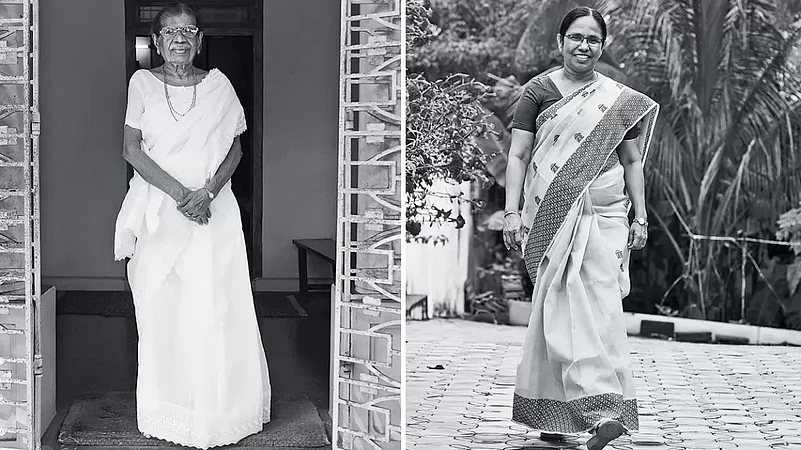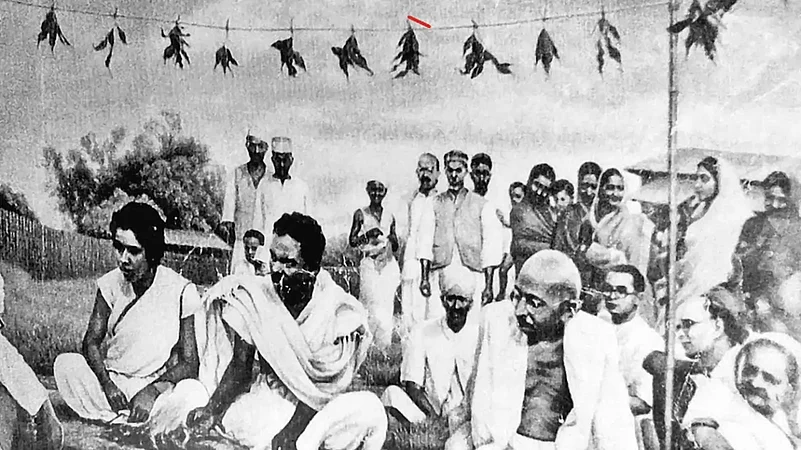In Kerala’s rich political history, three extraordinary women—Dakshayani Velayudhan, K R Gouriyamma, and KK Shailaja—stand united by a century of shared destinies, unwavering doggedness and lasting influence.
Dakshayani was the sole female Dalit member in the Constituent Assembly, Gouriyamma served as the inaugural Revenue Minister in the world’s first democratically elected communist government in Kerala, while more recently, Shailaja garnered international recognition for her exemplary leadership in public health administration during the COVID crisis as the southern state’s Health minister.
The three women embody awe-inspiring narratives of unwavering resilience against the intersecting forces of caste and gender-based oppression. Each of them left an indelible mark as exceptional political leaders. Their narratives also serve as a testament to the enduring power of patriarchy, which often seeks to suppress and marginalise outspoken women.
Born in 1912 on Bolghatty, a tiny island off Kochi’s coast, Dakshayani hailed from a ‘Pulaya’ family, among Kerala’s most marginalised agrarian slave castes. Her birth coincided with a transformative era in Kerala, characterised by pioneering equality and recognition efforts, cultivated by the struggles led by the legendary Dalit leader Mahatma Ayyankali (1863-1941).
In an era when Dalit women were systematically denied the right to cover their upper bodies, Dakshayani, India’s first Dalit woman graduate, bravely defied these oppressive norms by wearing clothing that covered her breasts. Her legacy is a series of pioneering achievements, particularly in advancing women’s empowerment. She made history as the first Dalit woman legislator when nominated to the Cochin Legislative Council in 1945. The following year, she received a nomination to the Constituent Assembly, standing as the lone Dalit woman among the 389 members tasked with shaping India’s Constitution.

Her remarkable journey in the Constituent Assembly began with her inaugural speech on December 19, 1946, where she passionately advocated for the upliftment of Dalits. Her marriage to R. Velayudhan, a Dalit leader and Parliament member, took place at Kasturba Ashram in the presence of Gandhi and Kasturba, with the ceremony officiated by a leper. But despite a personal bond with Mahatma Gandhi, Dakshayani Velayudhan, as per Cherayi Ramdas, the author of her recent biography Kaala Shasanakalkku Keezhadungatha Dakshayani Velayudhan, was a vocal critic of the Mahatma.
Even B R Ambedkar did not escape her critical scrutiny; she staunchly opposed his proposition for a separate electorate for Dalits. She argued that a segregated electoral system would not effectively facilitate the integration of Dalits into the mainstream, according to Ramdas.
As a member of the Cochin Legislative Council, Dakshayani Velayudhan introduced a resolution aimed at eliminating the term ‘depressed class.’ Her argument was that the term reinforced the community’s inferior social status. Furthermore, despite her personal connection with Gandhi, she did not shy away from expressing her discontent with the term ‘Harijan’.
“With all my respect to the authors (Gandhi)… the name ‘Harijan’ is felt like calling a dog ‘Napolean’, or ‘Hitler’, so long as untouchability remains,” she said while pressing the resolution in the state assembly in 1945.
***
Like Dakshayani, K R Gouri, affectionately known as Gouriyamma, was born in the early 1900s. Renowned for her pivotal role in reshaping Kerala’s socio-political landscape as a crucial member of its inaugural cabinet, Gouriyamma holds the distinction of being the first woman graduate from the historically disadvantaged Ezhava community in Travancore. She benefited from reformist movements led by visionary figures like Ayyankali, Sree Narayana Guru and Sahodaran Ayyappan—eminent political leaders and philosophers who laid the groundwork for modern-day Kerala.
Gouriyamma pursued her undergraduate studies at Maharaja’s College in Ernakulam, the same institution where Dakshayani Velayudhan was a pioneering first Dalit female student. After completing her graduation, Gouriyamma studied for a law degree and embarked on her legal career at the Cherthala Munsif Court in Alappuzha. She was the first female lawyer from the Ezhava community.
During this period, as Travancore grappled with resistance against C P Ramaswami Iyer’s authoritarian rule, Gouriyamma delved into politics. She organised peasants and labourers in Alappuzha, aligning with the banned Communist Party. Her activism resulted in her arrest and enduring brutal torture alongside other Communist leaders. She later vividly described her ordeal, saying, “If police batons could impregnate, I would have conceived several times.”
In Gouriyamma’s life, the personal and political were intertwined. She parted ways with her husband, T V Thomas, with whom she had been associated since entering politics. In 1964, when the party split, Gouriyamma joined the CPI (M), while T V Thomas remained with the CPI.
Like Dakshayani Velayudhan, K R Gouri achieved numerous milestones that catalysed profound social transformation. On April 30, 1957, she made history by presenting the first-ever bill in the first legislative assembly of Kerala. This groundbreaking legislation, titled the ‘Bill for the Stay of Eviction’, aimed to prevent the expulsion of destitute and homeless individuals by landowners.
On December 18, 1957, K R Gouri introduced the epoch-making Agrarian Relations Bill, which dismantled entrenched feudal structures in Kerala. The cumulative impact of this bill, along with the ‘Stay of Eviction’ legislation and the Land Reforms Act, initiated under the leadership of E M S Namboodiripad in the inaugural government, played an instrumental role in shaping modern-day Kerala—a region internationally acclaimed for its exceptional Human Development Index standard.
***
Kerala’s battle against COVID-19 was led by its general K K Shailaja, then a state health minister. The battle, in fact, began much before the virus landed in God’s Own Country.
This remarkable preparedness stemmed from Shailaja, whose adept administrative skills had garnered international recognition for effectively containing not only COVID-19, but also the deadly Nipah virus in previous years.
In late January, upon reports of the virus spreading in China, Shailaja held a crucial discussion with the health secretary. She highlighted the significant number of Malayali students at Wuhan University, prompting immediate action. The next day, a rapid response team was assembled. Directives were also sent to District Medical Officers (DMOs) to set up control rooms in each district’s administrative hub. Healthcare professionals were deployed at the Kochi International Airport to enhance surveillance.
Although a mock drill had been slated for early February to prepare for a potential outbreak, events unfolded faster. Before the scheduled drill, a Wuhan medical student arrived in Kerala on January 25, becoming India’s first identified Covid-positive case. Kerala had already adopted the WHO-prescribed ‘test, trace, and isolate’ protocol well before her arrival, showcasing the state’s exceptional foresight and proactive approach to the impending public health challenge.
Shailaja gained international fame, earning accolades such as ‘Corona Virus Slayer’ in The Guardian and being named ‘Leader of the Year (2020)’ by Vogue India. She also secured the top spot in the ‘World’s Fifty Thinkers of the Year 2020’ by Prospect magazine, surpassing notable figures like New Zealand Prime Minister Jacinda Ardern and African American philosopher Cornel West. The United Nations recognised her contributions on “Public Service Day 2020” and invited her to speak at a webinar honouring key figures in the fight against the pandemic.
Shailaja had already gained global recognition for her exceptional crisis management during the 2018 Nipah virus outbreak. Under her leadership, the outbreak was successfully contained, resulting in the lowest recorded death toll for the virus worldwide. Despite the high Nipah virus fatality rate and its WHO classification as a high-priority concern, efficient surveillance identified the virus early, minimising the death toll to just 17, a record low worldwide, highlighting Shailaja’s crisis management talent.
Despite their remarkable achievements, Dakshayani Velayudhan, Gouriyamma, and Shailaja faced the glass ceiling. After serving in the Constituent Assembly and Provisional Parliament in 1952, Dakshayani Velayudhan was excluded from official positions. According to Ramdas’s biography, other female Constituent Assembly members received electoral tickets or joined state committees. Known for her rebellious spirit and dissent even towards leaders like Gandhi, Jawaharlal Nehru, and Ambedkar, Dakshayani eventually took a clerical role at LIC after leaving Parliament.
Gouriyamma’s political career saw her elected to the Kerala Legislative Assembly multiple times from 1957 onwards. She held ministerial positions three times with the Left Democratic Front (LDF) and later two times with the United Democratic Front (UDF). In 1980, she served as the second-in-command in the E K Nayanar cabinet, entrusted with crucial portfolios including industries, agriculture, vigilance, and social welfare. In 1987, the party projected her as the next chief minister with the popular slogan “Let the land of coconut be ruled by K R Gouri.” However, despite her significant contributions, she was never appointed as the Chief Minister, and she grappled with misogyny within her party throughout her life. Eventually, she distanced herself from the party and was expelled in 1994. Later, she formed her own party, Janadhipathya Samrakshana Samiti, and joined the UDF. In the years leading up to her passing, Gouriyamma was welcomed back to her original party, the CPI (M).
Shailaja’s experience parallels Gouriyamma’s in many ways. Shailaja’s widespread popularity played a pivotal role in the Left Democratic Front’s (LDF) victory for the second consecutive term in 2021. However, her exclusion from the state cabinet raised significant concerns and ignited a spirited debate within Kerala’s political discourse. While all incumbent ministers, except for Pinarayi Vijayan, were left out of the new cabinet, Shailaja also found herself without an exemption from this restructuring. This development triggered heated debates in the social media, with many expressing profound disillusionment over this decision. Additionally, the party declined to support Shailaja for the prestigious Magsaysay Award, although she was selected for it in 2022. Shailaja declined it due to inconsistencies with the policies of the CPI (M).
(This appeared in the print as 'Glass Ceilings, Lost Leaders')


























